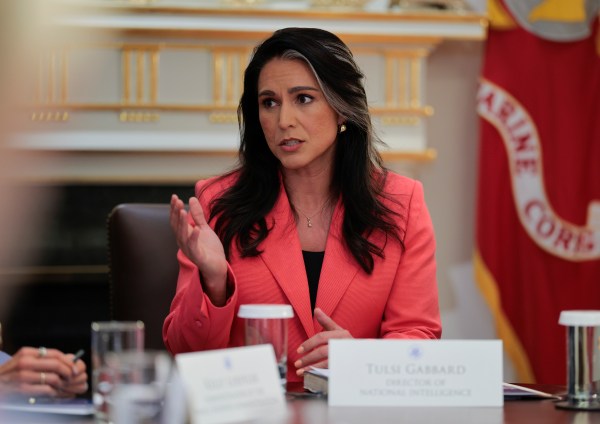After a bipartisan deal that would have reformed immigration policy and appropriated funding for Ukraine, Israel, and Taiwan collapsed last week in the face of criticism from former President Donald Trump and House Speaker Mike Johnson, the Senate split the two proposals up and voted 70-29 on Tuesday in favor of a standalone $95 billion aid package for those countries.
Following the vote—which took place early Tuesday morning due to an hours-long filibuster from Republicans opposed to the legislation—opponents of such funding turned on the 22 Senate Republicans who supported it. Texas’ Republican Attorney General Ken Paxton, for example, tweeted that it was “unbelievable” that GOP Sen. John Cornyn of Texas, who voted for the bill, “would stay up all night to defend other countries borders, but not America.”
Cornyn, in response, referenced Paxton’s upcoming trial related to charges of securities fraud—he is alleged to have defrauded investors of a Texas-based technology startup by “hiding [he was] being compensated to promote the company’s stock” over a decade ago—and criticized the Texas attorney general for “pushing Russian propaganda” about the U.S. paying to protect Ukraine’s border but not its own.
Mollie Hemingway—a Fox News contributor and the editor-in-chief of The Federalist, a right-wing digital media outlet—responded to Cornyn with a tweet of her own that has amassed nearly 6,000 reposts and 16,000 likes. “Cornyn says if you care about securing the US border, you’re a Russian,” it read. “These people HATE America and its citizens. And they’re shockingly stupid.”
Hemingway’s post, however, blatantly misrepresents Cornyn’s original statement: His tweet does not accuse those in favor of stricter border security measures of being “Russian.” In fact, although Cornyn ultimately voted against the bipartisan border security and military aid package—after former President Donald Trump publicly lobbied Republican senators to tank it—the senator from Texas had originally been adamant that any additional funding for aid to Ukraine and Israel be paired with border and immigration reforms. “This is an opportunity for us to force the Biden administration to do what they should have been doing all along,” Cornyn told reporters in December.
Instead, Cornyn’s response to Paxton criticized the Texas attorney general’s comments specifically, arguing that they overlap with a propaganda narrative pushed by the Kremlin—that continued support for Ukraine’s war effort compromises efforts to secure the U.S.-Mexico border.
Russia has long targeted both the U.S. and its southern neighbors with disinformation intended to diminish those countries’ ongoing support for Ukraine, and the Kremlin regularly leverages domestic issues in foreign countries to sow political discord. “It’s not new for the Kremlin to focus on U.S. border security issues—Russian state media and Russian-linked troll farms have long focused on immigration and border security issues as one of the key wedge issues to highlight American divisions,” Bret Schafer, a media and digital disinformation expert at the Alliance for Securing Democracy, told The Dispatch Fact Check. “But since border security and aid for Ukraine have become intertwined due to congressional funding debates, there has been a clear spike in Russian state media’s focus on the southern border.”
Vladimir Putin himself referenced the border security narrative in his recent interview with former Fox News host Tucker Carlson. “[Does] the United States need this?” the Russian president said in reference to U.S. support for Ukraine. “What for? Thousands of miles away from your national territory. Don’t you have anything better to do? You have issues on the border. Issues with migration, issues with the national debt.”
Longtime observers of Putin see nothing new. “Pushing the idea that spending money on Ukraine will somehow make U.S. borders less secure is a classic Russian propaganda move,” professor Sarah Oates, an expert on Russian disinformation at the University of Maryland, told The Dispatch Fact Check. “Putin is skilled at finding the fear buttons to push in the American population, connecting two issues that aren’t related.”
While Russia is mostly seizing upon existing political tensions in the case of Ukraine funding, the Kremlin has been pushing another propaganda campaign designed to deepen tensions surrounding the standoff between Texas and the federal government at the southern border. Russian state-backed media outlet Sputnik has published multiple stories arguing the border crisis is indicative of a Constitutional and democratic collapse in the United States, and RT—which is also Russian state-controlled—openly referred to the issue as “Civil War 2.0” in one of its headlines. Dmitry Medvedev, former president of Russia and the current deputy chair of the country’s security council, echoed similar sentiments himself, tweeting that the establishment of an independent Texan state “is getting more and more real.”
Russian propaganda often targets issue sets, such as a foreign state’s domestic politics, that don’t directly impact the Kremlin. “This is pretty standard for the Kremlin’s information playbook. They are more than happy to focus on issues that have no direct bearing on Russian interests, so long as those issues advance their interests in other ways,” Schafer said. “In this case, the most direct pathway to achieving what they want (a drawback in U.S. aid for Ukraine) is not to discuss Ukraine, but rather to focus on an issue that Americans are more divided over and more passionate about.”
If you have a claim you would like to see us fact check, please send us an email at factcheck@thedispatch.com. If you would like to suggest a correction to this piece or any other Dispatch article, please email corrections@thedispatch.com.







Please note that we at The Dispatch hold ourselves, our work, and our commenters to a higher standard than other places on the internet. We welcome comments that foster genuine debate or discussion—including comments critical of us or our work—but responses that include ad hominem attacks on fellow Dispatch members or are intended to stoke fear and anger may be moderated.
With your membership, you only have the ability to comment on The Morning Dispatch articles. Consider upgrading to join the conversation everywhere.